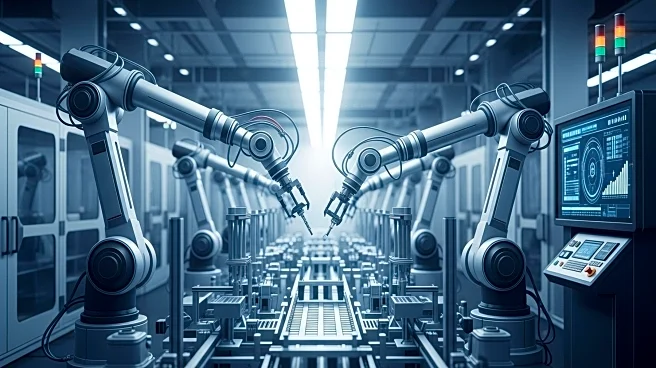What's Happening?
Congresswoman Luz Rivas and Congressman David Rouzer have introduced the Streamlining American Manufacturing Strategy Act, a bipartisan bill aimed at aligning various advanced manufacturing initiatives to a four-year timeline. The bill seeks to clarify goals and improve data collection efficiency within the manufacturing sector. Rivas highlighted the significance of advanced manufacturing for the U.S. economy, noting that the synchronization of efforts would create jobs and reduce costs. Congressman Rouzer emphasized that streamlining timelines could cut bureaucracy and strengthen domestic manufacturing. The bill also proposes amendments to the National Institute of Standards and Technology Act to ensure all related initiatives follow the same cycle. The legislation has garnered bipartisan support and has been introduced in the Senate as well.
Why It's Important?
The introduction of this bill is significant as it addresses the need for a more coordinated approach to advanced manufacturing in the United States. By aligning initiatives to a four-year timeline, the bill aims to enhance efficiency and reduce bureaucratic hurdles, potentially leading to increased job creation and cost savings. This could bolster the U.S. manufacturing sector, making it more competitive globally. The bipartisan nature of the bill suggests a shared recognition across party lines of the importance of manufacturing to the national economy. Stakeholders in the manufacturing industry, including businesses and workers, stand to benefit from streamlined processes and clearer objectives.
What's Next?
If the bill passes, it will initiate a more structured approach to advanced manufacturing initiatives, potentially leading to significant changes in how these programs are managed and executed. The amendments to the National Institute of Standards and Technology Act will require all related initiatives to adhere to the new timeline, which could prompt adjustments in current projects and strategies. Political leaders and industry stakeholders may engage in discussions to ensure the bill's provisions are effectively implemented, and further legislative actions may be considered to support the bill's objectives.
Beyond the Headlines
The bill's focus on streamlining manufacturing initiatives could have long-term implications for the U.S. economy, including fostering innovation and technological advancements within the sector. By reducing bureaucratic barriers, the bill may encourage more investment in manufacturing technologies, potentially leading to a more sustainable and resilient industrial base. Additionally, the bipartisan support for the bill reflects a broader consensus on the need to prioritize manufacturing as a key component of economic growth and national security.








